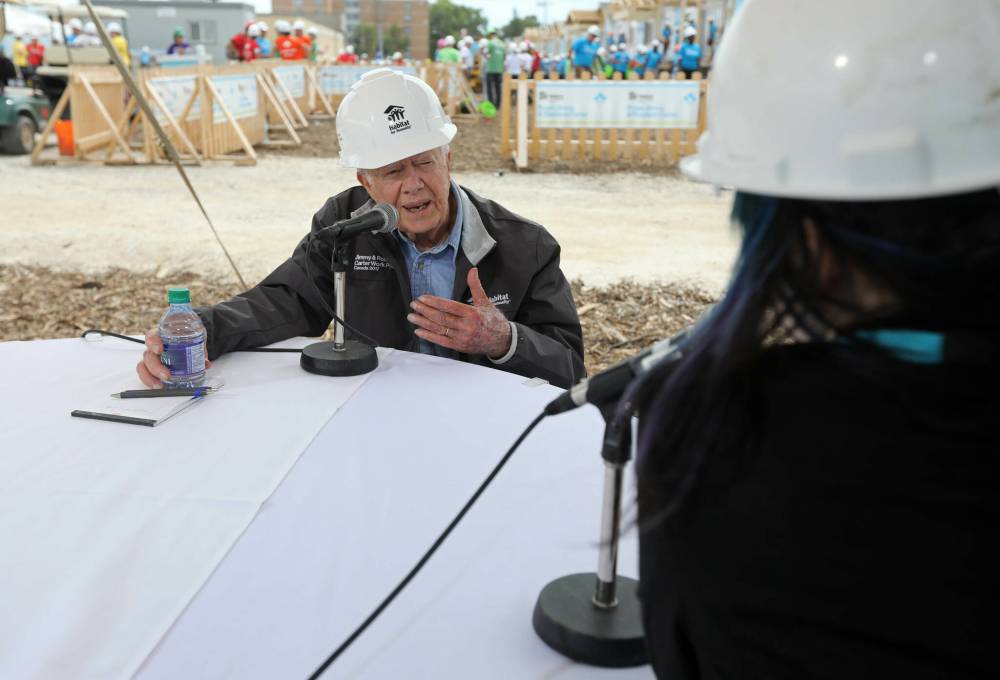Disarming, dedicated and so very decent
Conversation with then-fragile but formidable former U.S. president Jimmy Carter in 2017 leaves lifetime memory of genuine public servant
Advertisement
Read this article for free:
or
Already have an account? Log in here »
To continue reading, please subscribe:
Monthly Digital Subscription
$0 for the first 4 weeks*
- Enjoy unlimited reading on winnipegfreepress.com
- Read the E-Edition, our digital replica newspaper
- Access News Break, our award-winning app
- Play interactive puzzles
*No charge for 4 weeks then price increases to the regular rate of $19.00 plus GST every four weeks. Offer available to new and qualified returning subscribers only. Cancel any time.
Monthly Digital Subscription
$4.75/week*
- Enjoy unlimited reading on winnipegfreepress.com
- Read the E-Edition, our digital replica newspaper
- Access News Break, our award-winning app
- Play interactive puzzles
*Billed as $19 plus GST every four weeks. Cancel any time.
To continue reading, please subscribe:
Add Free Press access to your Brandon Sun subscription for only an additional
$1 for the first 4 weeks*
*Your next subscription payment will increase by $1.00 and you will be charged $16.99 plus GST for four weeks. After four weeks, your payment will increase to $23.99 plus GST every four weeks.
Read unlimited articles for free today:
or
Already have an account? Log in here »
Hey there, time traveller!
This article was published 30/12/2024 (344 days ago), so information in it may no longer be current.
In the spring of 2017, when I first learned the Free Press had tapped me to interview former United States president Jimmy Carter, the first thing I did was call my father. Carter was my American dad’s favourite president or, at least, the only one he truly respected.
When I was a little girl, peppering him with questions about the politics of his native country, it was the 39th president alone that he’d single out for praise. Carter, my father always said then, was too decent a man to be a good president.
As a child, I didn’t quite understand what he meant.

Still, I tucked his words away in my mind to be considered later; and when, as a grown-up, I heard I would get the chance to interview the former president, they came back to me again.
That July, Carter and his wife, Rosalynn, arrived in Winnipeg for the second time in their long lives. On both occasions, they had come to lead a Habitat for Humanity build, as they had done somewhere every year between 1984 and the outbreak of COVID-19.
On the first day of the visit, the build site was buzzing. Volunteers leaped to their feet as the Carters arrived; the former president spoke to the crowd for about 13 minutes, offering a long reflection on his Christian faith in a folksy, humorous speech.
Then he put on his hard hat and went to work along with the others, sawing at boards while his Secret Service security detail hovered close by.
When I had seen enough, I went back to my car to look over my notes and take a rest on the scorching day. “Doesn’t seem like much else will happen,” I recall thinking.
Well, that was a mistake. Minutes later, I looked through my windshield to see a flurry of activity around the site. I rushed back and learned the ex-president had fainted; he’d been instantly surrounded by his security detail and then taken away in an ambulance.
For the next few hours, news of his collapse gripped North American headlines. Then 92 and already a cancer survivor, Carter was undeniably fragile.
In the end, everything turned out fine. The former president was dehydrated and fainted in the heat; after a restful night at St. Boniface Hospital, he returned to the Habitat site, and to our scheduled interview.
It’s a surreal thing to sit in front of someone who has been president; the office bestows a magnetism proportionate to its power. It is not like other forms of celebrity.
Though he took it easy on the work that day, his determination to be present at the site spoke volumes of his values. No one would have objected had he opted to stay back at the hotel and protect his health; one perk of being in your 90s, surely, is that anything you can give is plenty.
That afternoon, we met under the shade of a tent flanking the row of new houses rising on that quiet St. James street. It’s a surreal thing to sit in front of someone who has been president; the office bestows a magnetism proportionate to its power. It is not like other forms of celebrity. You are speaking to a person whose signature alone affected the world as you know it, for better or worse.
And as a journalist, especially one from a humble town on the Canadian Prairies, I felt a little bit out of my depth. I’m not a chronicler of the world’s powerful. What do you even ask a man who had spoken to an uncountable multitude of reporters before you were even born?
That flutter of anxiety never fully left, but as it turned out, I needn’t have worried. In our short conversation under that tent, Carter proved that famous reports of his essential graciousness and humility were, if anything, actually a little understated.
He was warm to me, and welcoming. He held my gaze, and smiled through every answer in his gentle Georgia drawl, and acted as if our conversation was the only thing in the world. (Later, a Carter Centre staffer told me the interview was “extremely good” and he “could tell Jimmy was extremely interested,” which I added to my mental list of pick-me-ups to soothe future crises of confidence.)
We’d been asked by Carter’s handlers to keep the interview focused on Habitat work, and not stray into the political. In other words, given the prevailing mood at the time, “Don’t ask him about Donald Trump.”
… he seemed determined to spend his post-presidential time making amends for the tumults he oversaw in office.
Yet a president, even one from long ago, is an inherently political figure, and I sensed that this one was eager to weigh in; when I carefully left an opening for him to discuss the election that had recently brought Trump to power, Carter gracefully took it.
He spoke of the need to tackle income disparity; when people feel they aren’t getting a fair deal, he said, and that they lack prospects to improve their lives, “they’ll turn to almost any alternative that’s offered to them.” In other words, to rank populism.
Now, as we pause to remember Carter’s remarkable life, we need not veer into hagiography.
His presidency was deeply imperfect, as all of them are. I’ll leave the final assessment of his historical legacy to the historians, but it is fair to say his administration made a lot of moves that did harm, and left the world an arguably more dangerous place.
Yet, what made Carter so beloved and so worthy of admiration is that, with a moral conviction unique among living ex-presidents, he seemed determined to spend his post-presidential time making amends for the tumults he oversaw in office.
For most presidents, their time in office is the peak of their achievement. For Carter, those four years turned out to be just a small part of a long and indisputably genuine life of service, one in which he used the magnetism of the title to make the world a better place for people.
He championed human rights, and wrote with an ardent moral clarity on the path to peace for Israel and Palestine. Through the Carter Centre, he led a global effort to destroy Guinea worm disease, which caused vast suffering in 20 countries between Africa and Asia.
Once, he said he hoped to see the disease dead before he was. Well, it’s not quite there yet, but close enough: last year just 14 cases were recorded, down from more than 3.5 million in the mid-1980s. It has been eradicated in 17 nations where it was once endemic.
And to understand something else about his legacy, we can look at just one small moment.
One month before his 2017 visit to Winnipeg, Carter took a Delta Airlines flight to Washington, D.C. As the plane readied for its takeoff, the president, trailed by a stone-faced Secret Service agent, shuffled down the aisle, shaking hands with every single passenger.
In fact, it wasn’t an unusual event: Carter did that every time he took a Delta flight, the airline said in a Tweet this week. Yet, for whatever reason, a video of that particular instance took off like wildfire on social media, racking up millions of views and international news coverage.
Carter was too decent of a man to be a good president, my father always said. Now, all these years later, I’ve finally seen enough to know exactly what he meant.
People were fascinated by the video, by seeing a former president — especially one in his 90s — so casually taking time to greet so many people, for no particular reason other than that he knew that he could give them a delightful memory with that one small gesture.
A thought occurred to me as I watched the video. One can reasonably guess that about half of the people on that flight voted for Trump, whose political and personal values are, to say the least, vastly different than Carter’s. Yet all were eager to meet Carter; the flight was abuzz.
That excitement, and the fascination of those who watched it later, all of it spoke to a sort of yearning that still exists, even as the political landscape of the United States — and Canada — grows more vicious, more cynical and more coarse.
To be genuine, to be honest about one’s values, and to be fully present with people — I believe we still want that, of our leaders. We still want someone who we can trust is acting not out of personal gain, or desire to hold power, but out of a deeper moral conviction.
Unfortunately, the machinations of power, and the pursuit of it, has a way of grinding up such leaders. Carter was too decent of a man to be a good president, my father always said. Now, all these years later, I’ve finally seen enough to know exactly what he meant.
Melissa Martin is the Free Press’s writer-at-large. She is currently on leave in Ukraine.

Melissa Martin
Reporter-at-large
Melissa Martin reports and opines for the Winnipeg Free Press.
Every piece of reporting Melissa produces is reviewed by an editing team before it is posted online or published in print — part of the Free Press‘s tradition, since 1872, of producing reliable independent journalism. Read more about Free Press’s history and mandate, and learn how our newsroom operates.
Our newsroom depends on a growing audience of readers to power our journalism. If you are not a paid reader, please consider becoming a subscriber.
Our newsroom depends on its audience of readers to power our journalism. Thank you for your support.












